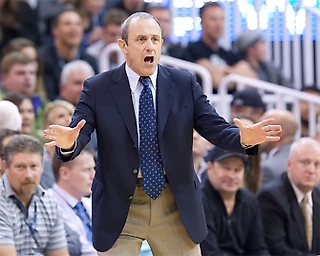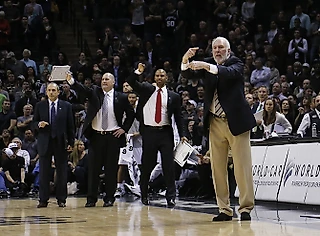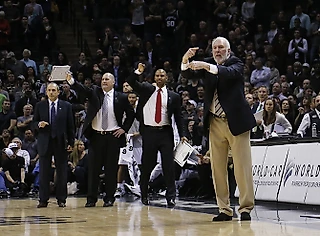Developing strengths or working on weaknesses?
Messina Online
Last time when we were talking about motivation, I mentioned that understanding strengths and weaknesses, and knowing how to use strengths and hide weaknesses is essential for confidence and responsibility development that are needed to perform on the highest level.
Today we'll get down to strengths and weaknesses in more detail.
To hide your weaknesses, you must be aware of what your weaknesses are, you must acknowledge them. This usually makes people afraid, even scared. It seems very simple, but at the same time it is difficult as it might hurt your pride.
Since I started coaching youngsters long time ago, I always tried to help players to go through this process. Players must understand that their coaches are working with them, not only to use what they can do, but also to help them to advance to the higher level, to acquire new fundamentals that will stay with them throughout their career.
Some players accept this, some players feel reluctant. They are afraid of the idea of even discussing their weaknesses at the beginning.
I always tell the story. When I was coaching the national team of Italy, one very famous player told me: "I understand that you are trying to instruct me on how to use my left hand and play on the left side of the court. I'm not good at it. I play very well with my right hand on the right side of the court. You are a good coach, if you'll just use my strengths". I respect this opinion, but I totally disagree. And we parted our ways.
When I select players for my teams I try to select the ones who are not afraid of being aware of their weakness and who are ready to work on these weaknesses.
In my opinion, you're a good coach, if you can improve your players. To improve a player you both need to understand and acknowledge his weaknesses and decide how to overcome them. This is a great motivation for me as a coach. Especially with young players, but also with experienced ones.
Developing strengths and eliminating weaknesses are two sides of the medal. If you fix the weakness, you add up to your strengths.
Suppose, I cannot shoot well. I keep on working on my shooting fundamentals. My shooting percentage goes up. Immediately, I get more versatility and technical strengths with the other elements in my arsenal as well.
Many times I heard an opinion that if you're good with, let's say, your right hand, you should focus on developing it even more. It's a wrong concept. Let me explain why.
If you develop your left hand a little bit, it gives you more versatility. In basketball, versatility is the first thing to surprise the opponent with. If you're limited to only a few things you can do well, you're in big trouble.
Getting versatile has its chain effect. I still can use my right hand, but I can also use my left hand now. If I face an opponent, I can go right as well as left. I can surprise him. I have more freedom in choosing my next action.
If all you can do is go right, you'll depend on your opponent. Once he blocks your movement to the right, you have to pass. This limits your freedom, your value for the team.
The more fundamentals you have, the more confident and unpredictable you are on the court. You can do everything — go right, left, stop, shoot or pass.
The eventual goal is to become a complete player.
Many years ago, in 80s and early 90s, NBA cultivated the idea of specialization. There was a theory that all players (except superstars) should become specialists in one field — either shooting, rebounding, defending or passing. That theory represented a big problem. If you have too many specialists, you become predictable. The higher number of complete players you have, the better the game is.
That's why I have always liked to have 3 guards on the court. In Virtus and CSKA we usually played with 3 guards. With 3 guards you always have at least 3 players who can shoot, dribble, pass and play defense.
One more thing is worth pointing out. I think the more talented the player is, the more he should work on his fundamentals to become a complete player.




